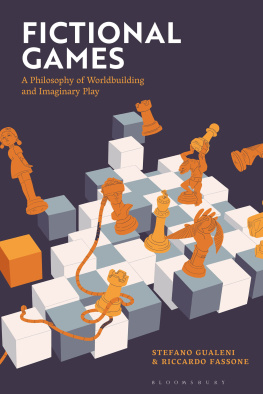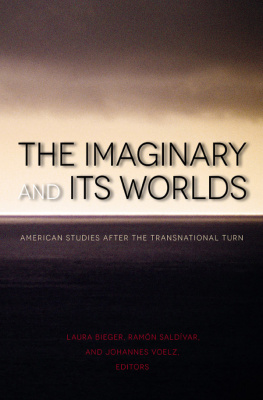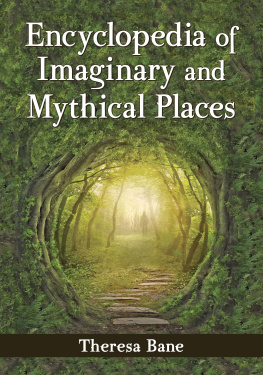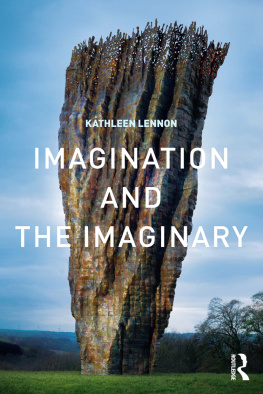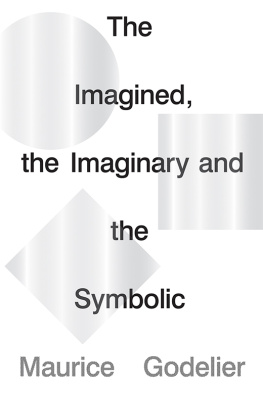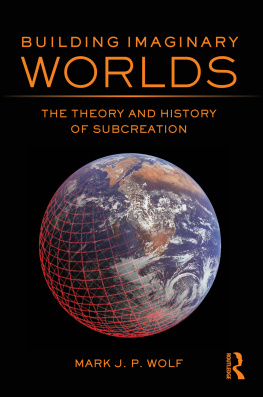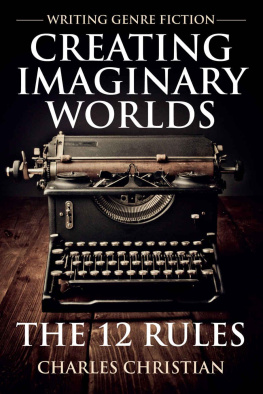
REVISITING IMAGINARY WORLDS
The concept of world and the practice of world creation have been with us since antiquity, but they are now achieving unequalled prominence. In this timely anthology of subcreation studies, an international roster of contributors come together to examine the rise and structure of worlds, the practice of world-building, and the audiences reception of imaginary worlds. Including essays written by world-builders A. K. Dewdney and Alex McDowell and offering critical analyses of popular worlds such as those of Oz, The Lord of the Rings, Star Trek, Star Wars, Battlestar Galactica, and Minecraft, Revisiting Imaginary Worlds provides readers with a broad and interdisciplinary overview of the issues and concepts involved in imaginary worlds across media platforms.
Mark J. P. Wolf is a Full Professor and Department Chair of the Communication Department at Concordia University, Wisconsin. His books include Abstracting Reality, The Medium of the Video Game, Virtual Morality, The Video Game Explosion, Myst and Riven: The World of the Dni, Before the Crash, Encyclopedia of Video Games, Building Imaginary Worlds, The LEGO Studies Reader, and Video Games Around the World. With Bernard Perron, he is the co-editor of The Video Game Theory Reader 1 and 2, and the Landmark Video Game book series.
REVISITING IMAGINARY
WORLDS
A Subcreation Studies Anthology
Edited by Mark J. P. Wolf
First published 2017
by Routledge
711 Third Avenue, New York, NY 10017
and by Routledge
2 Park Square, Milton Park, Abingdon, Oxon OX14 4RN
Routledge is an imprint of the Taylor & Francis Group, an informa business
2017 Taylor & Francis
The right of the editor to be identified as the author of the editorial material, and of the authors for their individual chapters, has been asserted in accordance with sections 77 and 78 of the Copyright, Designs and Patents Act 1988.
All rights reserved. No part of this book may be reprinted or reproduced or utilised in any form or by any electronic, mechanical, or other means, now known or hereafter invented, including photocopying and recording, or in any information storage or retrieval system, without permission in writing from the publishers.
Trademark notice: Product or corporate names may be trademarks or registered trademarks, and are used only for identification and explanation without intent to infringe.
Library of Congress Cataloging in Publication Data
Names: Wolf, Mark J. P. editor of compilation.
Title: Revisiting imaginary worlds : a subcreation studies anthology / edited by Mark J. P. Wolf.
Description: New York : Routledge, Taylor & Francis Group, 2017.
Identifiers: LCCN 2016032173| ISBN 9781138942059 (hardback) | ISBN 9781317375937 (ebk)
Subjects: LCSH: Creation (Literary, artistic, etc.) | Imaginary societiesAuthorship. | FictionHistory and criticismTheory, etc.
Classification: LCC PN56.C69 W675 2017 | DDC 801/.92dc23
LC record available at https://lccn.loc.gov/2016032173
ISBN: 978-1-138-94205-9 (hbk)
ISBN: 978-1-315-67336-3 (ebk)
Typeset in Bembo
by diacriTech, Chennai
DEDICATION
A. M. D. G.
TABLE OF CONTENTS
Rick Carter
Mark J. P. Wolf
Marie-Laure Ryan
Lily Alexander
Dimitra Fimi
Lars Konzack
Neal Baker
Erica Hurwitz Andrus
Edward Castronova
Lori Landay
Michael O. Riley
Henry Jenkins
A. K. Dewdney
Laura Cechanowicz, Brian Cantrell, Geoffrey Long, Alex McDowell, Jeff Watson, and Ann Pendleton-Jullian
William Proctor and Matthew Freeman
Matt Hills
Mark J. P. Wolf
Gerard Hynes
Jennifer Harwood-Smith
Helen Conrad-OBriain
Kevin Schut
Mark J. P. Wolf
Lily Alexander, Ph.D., has taught at New York University since 2003 and at the City University of New York since 2008. She authored a digital transmedia set Fictional Worlds (2014), which includes four interactive iBooks: The Genre System and The Symbolic Journey, Dramatic Characters and Action, Tragedy and Mystery, and Comedy and The Extraordinary. The print edition of this set is titled Fictional Worlds: Traditions in Narrative and The Age of Visual Culture (2013). She also wrote for the media and published for a range of academic forums including: Cinema Journal, Cinema Art, Journal of Narrative Theory, The Russian Review, and ]
Erica Hurwitz Andrus teaches Religion at the University of Vermont. Her main areas of research include Religion in America, and Religion and Popular Culture with an emphasis on film, television, and fandom. She earned her Ph.D. from the University of California, Santa Barbara, in 2006, where she wrote her dissertation on the relationship between Southern Protestant Evangelicalism and Bluegrass Music culture. She has published chapters on fandom and The Big Lebowski (1998), online memorials of Laura Roslin, and the role and portrayal of religion in dramas like Gran Torino (2008) and Orange is the New Black (2013-present). []
Neal Baker is Library Director at Earlham College. A Senior Bibliographer for the MLA International Bibliography, his scholarship includes published essays on Star Trek, anim vampires, Marvel Comics, Qebois science fiction, disaster novels, and various aspects of librarianship. []
Brian Cantrell is a media artist, researcher, and creative technologist who works in the areas of sonic interaction design, data visualization, and sonification. His work is rooted in exploration at the intersections of science, art, and design. His broader research interests include soundscape, phenomenology of perception, and embodied interaction. He is currently a Ph.D. student in the Interdisciplinary Media Arts and Practice division of The School of Cinematic Arts at the University of Southern California.
Rick Carter is a production designer and art director, known for his work in the film Forrest Gump (1994), which earned him an Oscar nomination, as well as numerous nominations of other awards for his work in Back to the Future Part II (1989), Back to the Future Part III (1990), Death Becomes Her (1992), Jurassic Park (1993), The Lost World: Jurassic Park (1997), Amistad (1997), What Lies Beneath (2000), Cast Away (2000), A.I. Artificial Intelligence (2001), The Polar Express (2004), War of the Worlds (2005), Munich (2005), Avatar (2009), Sucker Punch (2011), War Horse (2011), Lincoln (2012), and Star Wars Episode VII: The Force Awakens (2015). For his part in the Art Direction of Avatar, he was awarded the Academy Award for Best Art Direction alongside Robert Stromberg and Kim Sinclair. In 2013, Carter won his second Academy Award, for production design on Steven Spielbergs biopic,


